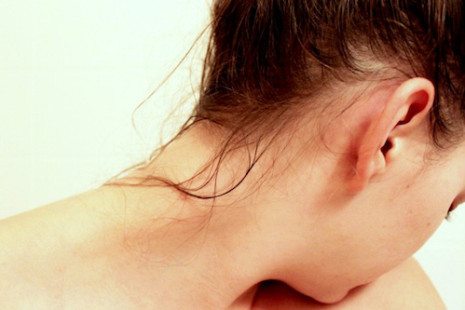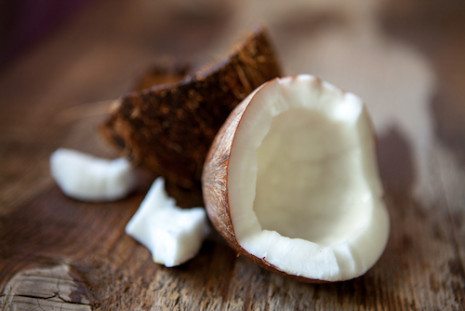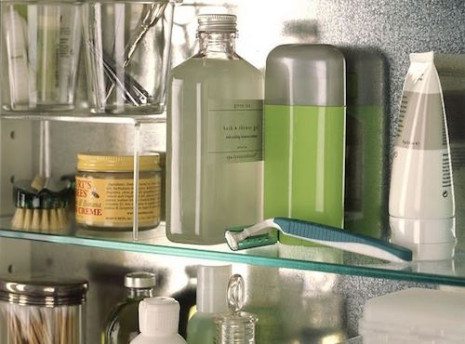
A natural hair washing routine may take a few tries to show results. However, your hair will feel and look so much better—and it’ll behave better, too!
Why Natural Oils Are Necessary for Healthy Hair
You may feel obligated to use silicone-containing products for shine, mousse for volume and a little hold, hairspray for a finishing touch.
Once you’ve heat-styled your hair, and you may even have a few extra products you use straight out of the shower. You may even try to protect it from the hair dryer and/or curling iron.
Step away from the drugstore (and most salon), shelves!
You don’t need all those things to have beautiful, shiny hair.
A lot of those drugstore and salon products simply coat your hair rather than penetrating to help heal and prevent damage the way natural products can.
They don’t address the problems, like breakage, dullness, or loss.
Instead, they cover it up and just put off the inevitable — obviously unhealthy, damaged hair.
Adding natural oils to your hair care regimen can work wonders for your hair’s softness, shine, and manageability. You can use them as a post-shower treatment on the length (sparingly). Or, use them as a deep conditioning treatment before you wash your hair.
Coconut Oil
Coconut oil can actually benefit your hair and scalp in several ways. Beyond providing moisture, the antimicrobial and antifungal advantages (along with vitamin E) help clear up or prevent dandruff.
The lauric acid also helps prevent protein loss when used as a pre-wash conditioner, which protects the hair from breakage.
Unless your hair is very coarse and thick, you probably won’t want to use coconut oil on dry or damp hair post-wash. This is because it’s very heavy and could quickly weigh down most hair types.
Olive Oil
Olive oil works in a similar way to restore moisture to your hair, and it’s been used by Mediterranean women for centuries.
Care2.com has an olive oil treatment that tells you how to nourish your hair with olive oil after a long winter of too much exposure to indoor heat.
This is another pre-wash treatment, but you can add a couple of drops of olive oil, to the length of your dry hair for extra shine and softness.
I don’t recommend it for thin, straight hair, but if your hair is at least of medium thickness and a little wavy, you’ll probably love it.
Argan Oil
Argan oil, which comes from a tree that grows in southwestern Morocco, has seen quite a bit of popularity lately in the beauty world.
It’s lightweight compared to olive oil and coconut oil, so it’s a fantastic leave-in conditioner for most hair types. You can even apply a couple of drops to dry hair if you’re dealing with some frizz without weighing it down.
The fatty acids, vitamin E, and antioxidants are the perfect combination for strengthening the hair and promoting a healthy scalp.
MindBodyGreen has a list of ways to use organic argan oil, including as an overnight conditioning treatment — using it in many different ways.
That’s something else we love about using natural oils on our hair—they’re multitaskers!
Everyone’s hair is different, so experiment with different types of oils. You could try avocado (great for thick hair!), or even sweet almond oil, too.
The Trouble with Using Too Many Products Too Often
Using several products on your hair can do more harm than good. It can coat your hair in product, making it more difficult for helpful products, like those natural oils, to penetrate.
Not only that, but using too many products just weighs your hair down and they can even counteract each other.
The serum you use to control frizz and add shine could cause you to lose volume at the top, then you feel like you need something for volume, too, but for that to work you may need to dry it and that calls for a heat protectant…it can feel like an endless (expensive and time-consuming), cycle.
How to Wash Your Hair
In general, the longer or thicker your hair, the longer you can go without washing it. The natural oils from your scalp will work their way down the shaft of your hair over the course of a couple of days for moisture and protection.
Help the oils down the length of the hair with a natural bristle brush. Here’s a sample natural hair washing routine, but adjust for hair length, texture, and thickness:
- Apply the oil of your choice to damp hair and scalp, wrap it up, and wait anywhere from 30 minutes to overnight (it really depends on how much time you have and how thick/coarse your hair is). Applying heat via a warm towel or a brief moment with a hair dryer will help the oil penetrate the hair.
- Wash with a natural shampoo and apply a light, natural conditioner to the ends. Wait a couple of minutes, then rinse. (Some of my favorite brands are Ojon, Dr. Bronner’s, Hamadi, and 100% Pure). Be sure to use your fingertips to massage and boost scalp circulation. Some people like to really scrub with their fingernails, but that can break your hair.
When to Wash Your Hair
- Skip at least one day, and up to five or six (for very thick, coarse, or dry hair) before washing again. If your hair looks oily, try a natural dry shampoo made from arrowroot and essential oils (Wellness Mama has a few different recipes on her site) to soak up some of the oil at the roots. You can also try rinsing with water in the shower and add a little conditioner or oil if your hair feels dry afterwards.
- Around day 3 or 4, most people will probably want to wash their hair again. If your hair feels especially heavy, you could try rinsing with lemon juice or ACV (leave it on for 5-10 minutes before rinsing it out), followed by a light conditioner and/or a few drops of olive or argan oil.
- Deep condition with a natural oil every 7-14 days.
Avoid heat styling as much as possible. We even have a video about how to curl your hair without using heat.
Ingredients to Look For and Which Ones to Avoid
Some hair products contain ingredients that can damage your hair or your health. Others get in, do a good job of making your hair better and aren’t linked to any health risks.
What to look for in your natural hair care products:
- Natural, moisturizing oils: This includes oils like sweet almond, kukui, argan, hempseed, jojoba, and coconut, but it’s not limited to those, of course.
- Essential oils: These are often used in the place of fragrance, so you’ll smell nice without the toxic chemicals. This could be rosemary, lavender, peppermint, etc.
- Aloe vera: Aloe vera offers moisture and really nourishes the hair and scalp, plus it can help prevent or eliminate dandruff.
- Plant extracts: These offer a variety of benefits, like boosting circulation, speeding hair growth, and treating a dry scalp.
Ingredients in hair products you should avoid!
- Sulfates: These ingredients allow shampoo to lather. You may see sodium lauryl sulfate, ammonium lauryl sulfate, or sodium laureth sulfate on the label. They can be skin irritants, plus they’ve been linked to damage of cell membranes and even death in animals. These are in lots of skin care products, too.
- Fragrance: You never know what may be under that “fragrance” label, and at the very least, it could turn into an allergic reaction (itchiness, flaky scalp, etc). There could also be hormone disruptors and other health concerns here, too.
- Silicones: These are usually added to give the hair a shiny, sleek finish. Watch out for any ingredient that ends in “cone.” These may make your hair look good short-term, but what they’re really doing is coating your hair and making it harder for moisture and other beneficial, natural products to get in and repair your hair. Over time, that coating can also lead to breakage.
- Parabens: These are used as preservatives in certain personal care products, and some have been linked to cancer and hormone disruption.
Don’t Neglect Your Diet
You know this, but I have to say it again: A healthy diet is the foundation for the strongest, shiniest, most beautiful hair possible.
Beautiful hair comes from the inside out, but using a natural hair washing routine will allow that beauty to—no pun intended—shine.
Love,
Kimberly




thanks for sharing I’m actually at the beach right now listening to some of your podcast shows
Hi Kimberly…You left out Avocado Oil! Amazing for the hair. Anti Bacterial/Antifungal, shown to stimulate hair growth, etc….Amazing nutritional and topical oil. (I use Organic Cold Pressed, Extra Virgin Avocado Oil)
I use a mixture of Coconut and Avocado Oil because I get the benefits of Strengthening and Moisturizing my hair.
Hello what can you recommend for colour hair?
Hi Kimberly, I love reading your blog and I LOVED this past week’s youtube video on how to make your own deodorant. Would you consider making a video on how to make your own natural hairspray? I have a terrible cowlick that my hair stylist says will not go away without me hairspraying and teasing my hair, but I don’t want to use any of the toxic hairsprays on the market. I’d like to make my own. Thanks for your work on this blog and your help! ~Mel
Thanks for sharing this information. I would add also Tea Tree Oil, with antibacterial and antifungical properties and it is also a good remedy for dry scalp…
Thanks for sharing this! I would add also Tea Tree Oil, with antiseptical properties and a good remedy for dry scalp as well…
We can definitely make natural shampoos and conditioners to heal our hair and keep it healthy. I’ve been using my homemade shampoos for a few years and my hair has never been better- even though I use an iron on it at times. Baking soda is a great way to take product build up out, and part Apple Cider vinegar, part water is great for a conditioner.
Hi, what are your thoughts on macadamia oil?
After switching to a sulfate free non lathering cleansing conditioner, my hair started growing faster and stayed thick as it got longer rather than thinning out at the ends like what a lathering shampoo would cause.
I have read about how buildup on the scalp can prevent faster hair growth, so using silicones isn’t the best for scalp either and a clarifying low lathering shampoo (like ouidad clarifying cream) can really help get that buildup off.
baking soda acts as an exfoliant for the scalp and is also clarifying.
Scalp massage (in my case, vigorous scrubbing) can help hair grow, too.
I like to use a small amount of Josie maran light argan oil on the lenthgs of my hair. It REALLY helps to smooth my crazy frizzy ends when I use it, but it’s not greasy.
Amy b- Thanks for the tip on the avocado oil!
Pretty! This has been an extremeely wonderful post. Thanks for providing this information.